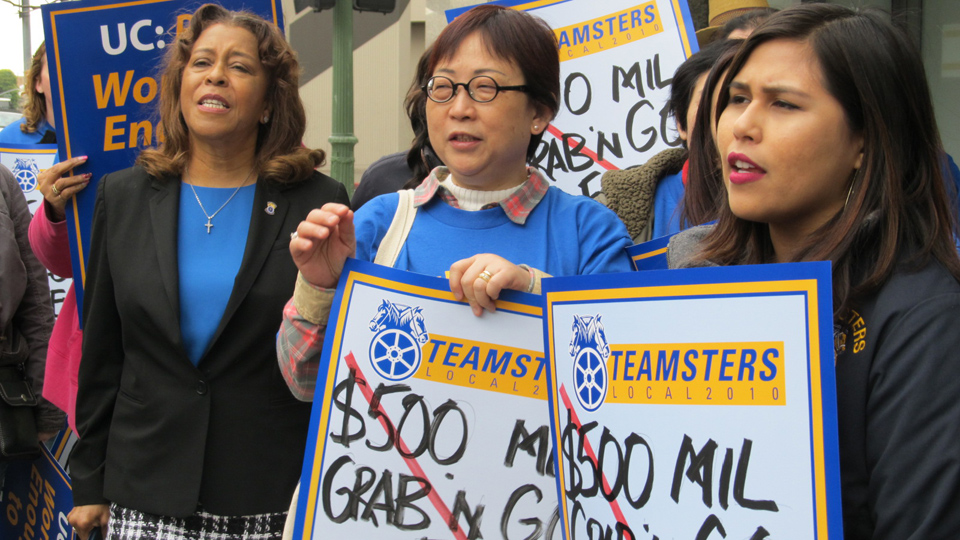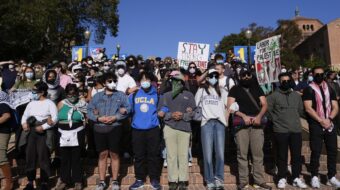
OAKLAND, Calif. – The University of California’s usually staid executive office building was the site of a lively, spirited gathering Feb. 15 as nearly 100 members of Teamsters Local 2010 rallied outside its doors. Chanting and drumming, they demanded the university bargain in good faith to address a 24 percent decline in real wages in the last two decades. They also protested the University’s announced plan to shift from a defined benefit retirement plan to a far riskier 401(k) plan.
The union’s secretary-treasurer, Jason Rabinowitz, asked the crowd, “Can they have a University of California without our work? Could they have a hospital without our work? Could they have a campus without our work? But are they showing us fairness and appreciation for keeping this institution running every day?” To each question, the crowd responded with a resounding “No!”
Local 2010 represents nearly 14,000 workers at all 10 UC campuses, five medical centers and Lawrence Berkeley National Laboratory. Most are administrative, clerical and essential support workers. Some 81 percent of the workers are women, and 63 percent are people of color. Nearly 60 percent have earned a bachelor’s degree or higher, with many being UC alumni.
On two campuses, UCLA and UC San Diego, Local 2010 also represents skilled trades workers.
The union has been in negotiations with UC’s administration for nearly a year. All three bargaining units are now working without a contract.
This week’s rally follows a wave of strikes by the local across the system last month.
The union charges that the UC administration has engaged in unfair labor practices, including failure to bargain in good faith, stalling talks, interfering in workers’ rights to participate in union activities, and threatening retaliation for participating in a strike.
The university’s proposed shift to a 401(k)-style retirement program was also a target of the protest.
The union says making this change will cost UC an additional $500 million in the first 15 years, and will mainly benefit highly-paid UC executives and senior management, while providing lower-paid workers with smaller benefits and greater risk.
“It is not fair for the University to push a wasteful retirement plan on us, Local 2010 President Catherine Cobb told the crowd. Cobb, a former UC Irvine worker, said union members “would much rather see that additional money reinvested in our wages so we can provide for our families.”
A study of UC administrative workers undertaken by Occidental College last October supports her statement. Of almost 3,000 respondents to the survey, nearly three quarters said they are the primary income earners for their households. Nearly all were working 30 or more hours weekly, and 70 percent said they struggle to put adequate food on the table. They are thus considered food insecure under U.S. Department of Agriculture standards. This compares with 12.6 percent food insecurity among Californians statewide.
Conversations with three workers underscored these findings. One, who said she’s been an administrative assistant for 16 years, told of having to give up her apartment and rent a room, “just to be able to eat.” Another long-term worker said she must live with her adult daughter because she can’t afford to rent an apartment on her own. A third lives with several adult roommates and does without a car.
As a delegation from the local, including Rabinowitz, Cobb, and other union leaders, entered the executive office building seeking to present the union’s case to UC President Janet Napolitano, union members lined the walls of the wide main hallway.
They then filed to a nearby building housing the office of Dr. John Stobo, executive vice president for health services, where the union leaders sought to speak with him directly.
Though Napolitano was reportedly away from the office, they did indeed get to talk with Stobo.
Rabinowitz told the crowd that Stobo listened politely, saying he appreciated the message and would convey it to Napolitano when the two met the next day.
The University of California is the third largest employer in the state, and the sixth wealthiest university in the country. In the last 10 years, executive pay has gone up 58 percent, tuition for California residents has risen 332 percent, and total operating revenue has increased by 80 percent, to nearly $27 billion.












Comments